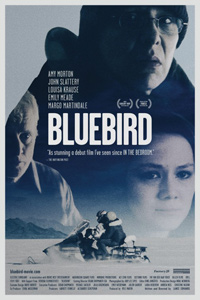Lives of Quiet Desperation: Edmond’s Masterful, Eloquent Debut
 “I stand in awe of my body. This matter to which I am bound,” is the poetic quote form Henry David Thoreau opening Lance Edmands’ impressive directorial debut, Bluebird. Dealing with a tragedy that has a rippling effect throughout a northern rural community in Maine, we’ve seen this type of dramatic dynamic countless times before, yet Edmands manages a haunting portrait of unhappy, increasingly desperate lives within a small community of deferred dreams and staunch facades. Originally premiering at the 2013 Tribeca Film Festival, the title ends its weary trek through the festival circuit to a much deserved theatrical release, though this type of grim, upsetting drama may have difficulty finding an audience due to its sobering subject matter. Dramatically restrained, Edmands deftly navigates the sadness of disconnect in our daily lives, and how terrible circumstances are often the impetus for waking up from that slumber.
“I stand in awe of my body. This matter to which I am bound,” is the poetic quote form Henry David Thoreau opening Lance Edmands’ impressive directorial debut, Bluebird. Dealing with a tragedy that has a rippling effect throughout a northern rural community in Maine, we’ve seen this type of dramatic dynamic countless times before, yet Edmands manages a haunting portrait of unhappy, increasingly desperate lives within a small community of deferred dreams and staunch facades. Originally premiering at the 2013 Tribeca Film Festival, the title ends its weary trek through the festival circuit to a much deserved theatrical release, though this type of grim, upsetting drama may have difficulty finding an audience due to its sobering subject matter. Dramatically restrained, Edmands deftly navigates the sadness of disconnect in our daily lives, and how terrible circumstances are often the impetus for waking up from that slumber.
The lives of two families are irreparably affected in a small town in northern Maine one cold winter. Bus driver Leslye (Amy Morton) lives a comfortable yet alienated existence with her husband Richard (John Slattery) of twenty years. The closing of the town paper mill is preoccupying him since it heralds the end of his occupation in the local logging company. Their teenage daughter Paula (Emily Meade) can’t seem to relate to either parent, convinced her father’s disconnection has more to do than just with work while she engages in her first sexual encounter with a classmate. We also meet Marla (Louisa Krause) a wretchedly unhappy waitress at a local restaurant, with dreams of being a singer but entrenched in drinking or smoking herself into oblivion on a nightly basis, either with strangers at the bar or her flirtatious co-worker (Adam Driver). After one particularly cold night, Leslye returns to work in the morning to discover the body of a small child locked in her bus—she’d been distracted during her routine clean-up the day before. We learn that boy belongs to Marla, whose mother Crystal (Margo Martindale) usually takes care of. But it was Marla’s responsibility to fetch him at his bus stop that particular day.
The use of a school bus driver and compromised children may recall Atom Egoyan’s 1997 masterpiece The Sweet Hereafter, but Edmands film feels more aligned with David Gordon Green’s 2007 feature, Snow Angels. This is the type of scenario that’s incredibly easy to muck up, as rural denizens are often miscast with beguiling actors (Sarah Colangelo’s Little Accidents comes to mind), or are flattened by their own heavy-handedness (Gaby Dellal’s Angels Crest, 2011). While the starry cast of Green’s film sometimes felt distracting (interestingly, two of his main characters also work in a Chinese restaurant), Edmands sidesteps that baggage with a cast of resolute character actors, led by a very moving performance form Amy Morton. Leslye’s devastation at her role in the child’s death is distressing to behold, if mainly because it feels so painstakingly realistic. The bird of the title represents that one moment, that one defining element of distraction that changes the courses of several lives. Ironically, it’s a winged creature with a particular set of historical baggage, with several cultures recognizing it as ‘the bluebird of happiness.’
Other cast members are equally impressive, including the always excellent Margo Martindale, and the increasingly prolific Louisa Krause (from Martha Marcy May Marlene and a memorable moment in Young Adult). Sadness prevails in their empty lives, and one can’t help but feel empathetic for Krause’s Marla as she explains the life that could have been had she not been pressured to follow through with her unwanted pregnancy.
John Slattery of “Mad Men” fame and Adam Driver are among other recognizable faces in Bluebird, their characters woven subtly into the fabric of the film’s narrative, which focuses mostly on the emotions of its female characters, including the daughter played by Emily Meade, a character perhaps on a similar path to that of Marla. With a carefully selected soundtrack consisting mainly of 1960s pop standards, which lends the film a rather nostalgic, place out of time feel. Jerry Butler’s “For Your Precious Love” and Marla’s karaoke rendition of the unabashedly melodramatic Skeeter Davis track ‘The End of the World” are testaments to the deep, unacknowledged yearning of these forlorn characters.
★★★½/☆☆☆☆☆


